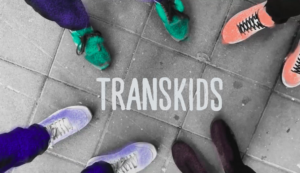By Eric George Tauber

CINCINNATI, Ohio — The traditional morning prayers include the following:
Men Say:
Thank you, Adonai who has not made me a woman.
Women Say:
Thank you, Adonai for making me according to Your divine will.
Growing up in a religious family, Noam Kaniel didn’t know how to pray these words. He felt that his physical body, then female, was not made according to divine will. To him, it seemed more like his soul was deposited into a body of the wrong sex. Noam is one of the subjects profiled in Transkids, a documentary film by Hilla Medalia, featured in the East Bay International Jewish Film Festival. Transkids follows the journey of four Israeli teenagers who identify as transgender: Ofri, Liron, Noam, and Romy.
“Your brain doesn’t fit your body.” -Ofri
Ofri is a trans-boy who struggles greatly with anxiety, rocking back and forth and gesticulating as he talks. Mundane tasks are sources of consternation, particularly using gendered restrooms.
“Going to the bathroom is a disaster. If you go into the girls, they scream. If you go into the boys, they laugh at you.”
Ofri’s mother is supportive while his grandmother is having a harder time with it, constantly using the wrong name, pronouns and verbs. (Hebrew has different conjugations for males and females.) She wants to be involved in their lives but watching her grandchild transition is a bitter pill to swallow.
“Inside, you’re one thing, but outside, you’re something else.” -Liron

By contrast, Liron is so masculine that it’s difficult to imagine him as a girl. He carries himself with the swagger of a young James Dean, but he also gives us some moments of genuine vulnerability. His own grandmother is far more accepting so long as he’s happy. Of course, it helps that Liron is the only grandchild who frequently comes to visit.
“Sometimes, the harshest prison is your own body.” -Romy
When Romy was a child, her mother sent her to a yeshiva to “fix” her feminine expression. Yet, when anxiety led to acts of self-harm, her mother realized that they needed to go in a different direction. Now, the tall and slender Romy works as a model who is vying for the crown of Miss Israel. In order to travel, she needs a passport. To get that, both parents need to sign the paperwork. Unfortunately, her father is in jail and they have no contact with him. Romy’s jailbird dad stated that he’d rather his son be a murderer than a tranny.
Noam’s father says that he can handle his daughter becoming his son, but if he were a lesbian… Oy Gevalt! Mr. Kaniel’s remark about homosexuality not being “normal” elicits some nervous laughter as they anticipate hate-mail from the rest of the LGBTQ community.
The Kaniels march as a family in a Pride parade where they meet a man whose sign bashes the religious. They argue with him that they’re religious and they’re in the parade. Moreover, Noam’s rabbi invited him to pray in men’s section. Yet -weighed down by his own baggage- the man is not convinced. It is likewise a benchmark moment for Ofri the first time he dons a kippah to pray at the Western Wall where men and woman are segregated.
“I’ve never met a transgender person who hasn’t had suicidal tendencies at one point or another.” -Noam Kaniel
The acceptance of transgender people in the Orthodox Jewish community is rooted in the principle of פקוח נפש Piku’ach Nefesh (the value of a soul). The rabbis judge that it is better for a person with severe gender dysphoria to transition and be happy than to end their own lives in despair. As for same-sex relationships, that’s something they are still not so keen on.
Gender transition for minors is being hotly debated in the U.S., with opponents arguing that young people go through many phases and are generally impulsive. Decisions they make today may lead to great regret tomorrow. Any parents of teenagers will see this as a valid point. However, a study published by the NYT showed that of the people who transitioned at a young age, only 2.5% later transitioned back. Therefore, for 97.5%, it was indeed the right decision.
The young people profiled in Transkids are more impatient than impulsive. They want to wake up as their ideal selves tomorrow. Ofri and Liron want top surgery NOW. Romy doesn’t want to wait until she turns 18 for genital reconstruction. She wants it yesterday. They do not waver in their desires. They are nervous about having surgery, but they do not get cold feet. Rather, they love themselves more when the deeds are done.
Most of the arguments against gender transition are coming from conservative Christian circles. If you’re not sure how you should feel about it as a Jew, this film is a good resource especially since it puts human faces on a controversial issue. And it wouldn’t hurt Christian leaders to learn a thing or two from the rabbis maybe?
Transkids is in Hebrew with English subtitles and runs 1hr 42 min. Transkids was sponsored by A Wider Bridge and is available through Eventive and the East Bay International Jewish Film Festival year-round.
And that’s Show-Biz!
*
Eric George Tauber, a former San Diegan now residing in Cincinnati, is a teacher, performer, and a drama critic. He may be contacted via eric.tauber@sdjewishworld.com
God created man and woman based on external sex anatomy